Perform a free Florida warrant search right away to determine if you or someone you know has an order for their arrest.
The state allows certain records — including those detailing warrants — to be accessed by citizens for personal use, promoting streamlined access to public information. During a search, online state databases and court records may assist with the process.
This resource lays out the most effective and efficient ways to access warrants in the state of Florida and explains how to address them properly.
Who Is Authorized To Access Warrants Issued in FL?
Florida recognized a citizen’s right to access public records and information on governmental activities by adopting the Sunshine Law in 1967. Chapter 286 of the Florida Statutes discusses this and ensures that the government must remain transparent in its activities.1 This helps empower the public and ensures the government is accountable for its actions.
In Florida, warrants – and the criminal records pertaining to them – are considered public records. People can view most types of warrant records as soon as they’re loaded into online databases. However, in some cases, law enforcement may withhold warrant information prior to execution to prevent disruptions during the investigation.
Records can often be found online. However, some local agencies may require a formal request or a phone call to carry out a warrant search.
Necessary Information & Insights To Search for Warrants in Florida
Before starting a Florida warrant search, individuals need to have basic identifying information for the person they seek. At a minimum, the researcher must have the following information to make the search process quicker:
- Name: Entering a full legal name is often the most effective way to locate a specific individual. However, if the person has a common name, this might not be enough to return the right person.
- Issuing Jurisdiction: Knowing the city or state that issued the warrant helps researchers find the correct databases to find relevant results. This is especially important for those who may have committed a crime in a different state.
- Date of Birth: When results return several matching individuals, a date of birth can identify the correct person. Many search tools also offer this as a potential field in the query section.
Several agencies hold warrant records, including those at the federal, state, county and city levels. Researchers can request information from these agencies online, sometimes at no cost. It’s advisable to start at the state level, then move to the county and municipal levels.
Checking from the broadest region, then narrowing down the search is often the quickest way to find someone’s warrant information.
Judges may issue warrants for numerous reasons, and most of them call for the arrest of the named individual. Information about these warrants can usually be found via the same channels, except in cases where publicly reporting such information can impede an active investigation.
How To Perform a Florida Warrant Search Online (Free Lookups)
In Florida, anyone can view warrant information with a quick online search. The Florida Department of Law Enforcement maintains the Crime Information Center Public Access System Wanted Persons Search, which serves as a warrant database.2 It has a disclaimer stating that it contains information as reported by law enforcement agencies.
However, it cautions that the database does not confirm whether the warrant serves as probable cause for an arrest and should not be used as the sole basis for legal action. If a warrant search returns a positive result for an individual, the state Department of Law Enforcement recommends that they contact the reporting agency for more information.
Be aware that people with an active warrant who contact the police department may be arrested on the spot.
The Wanted Persons Search requires basic information to return results. It has fields for:
- Last Name
- First Name
- Middle Name or Initial
- Nickname
- Race
- Sex
- Date of Birth (DOB)
- Age
Not all of this information is necessary; even a single letter in the last name field works. However, such a query typically prompts the database to warn that the results exceeded 500 individuals and recommends narrowing down the search parameters. Completing several fields returns fewer results, making it easier to navigate.
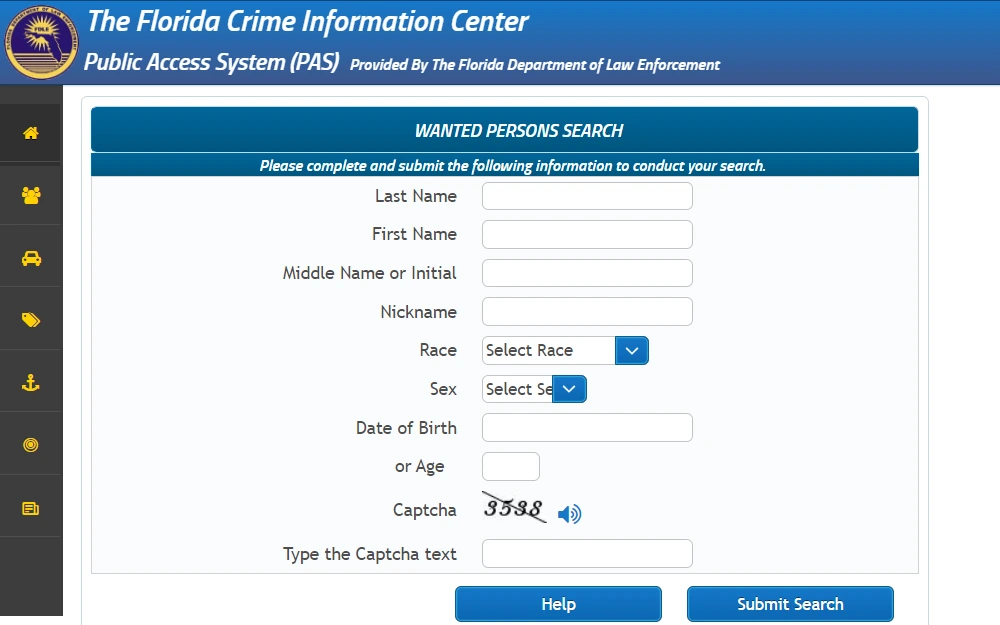
The search results are displayed as a table in alphabetical order by last name, providing the individual’s full name, date of birth, race and sex and the reporting agency. Clicking on the results reveals further information, including:
- Nicknames & Aliases
- Offense
- Agency Case Number
- Date of Warrant
- Warrant Number
- Physical Profile (including height, weight, hair and eye color, scars, marks and tattoos)
- Occupational
- Last Known City & State of Residence
There’s also a button to send tips about a wanted individual at the top of the page as well as the warrant reporting agency’s phone number.
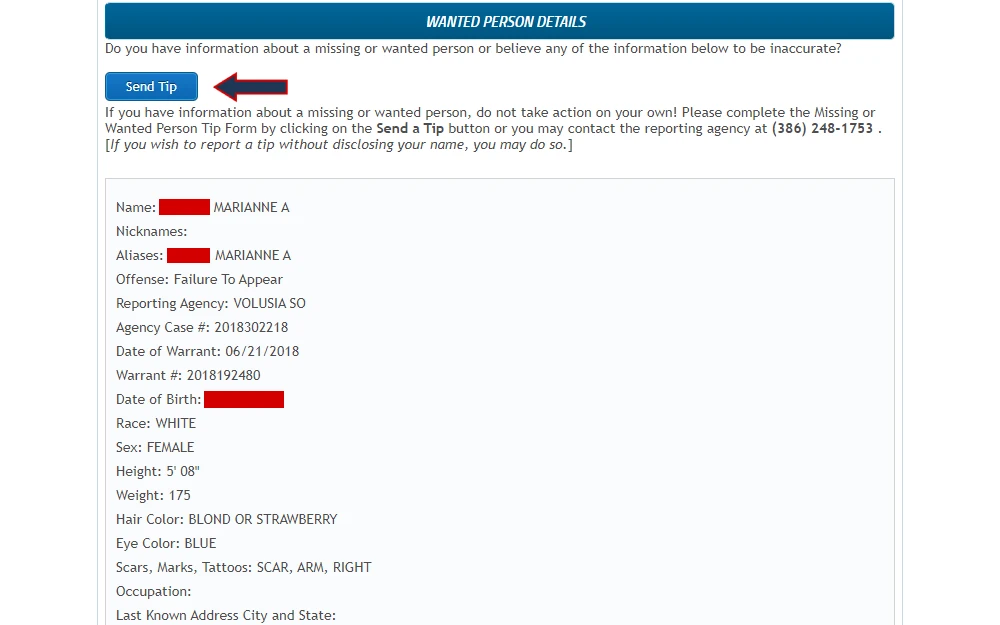
The Florida Department of Law Enforcement’s public records department accepts requests in person during the hours of 8 am to 5 pm on weekdays at:3
Florida Department of Law Enforcement
2331 Phillips Road
Tallahassee, FL 32308
Telephone: 850-410-7676
Fax: 850-410-7699
Email: [email protected]
Requests can also be made via mail to:
Attn: Office of the General Counsel
P.O. Box 1489
Tallahassee, FL 32302-1489
This tool also reveals individuals wanted for probation and parole violations. This information appears under the “Offense” results. However, no specific state tool exists to only look up probation and parole violators.
Locate Warrants in Florida via the County Courts, Clerks of Courts & Sheriff’s Offices
Many counties across the state have their own search tools available online for a warrant lookup. If the state database turns up results, checking the county tool may provide more information. If a county does not have a dedicated warrant search tool, individuals can often contact the appropriate county court clerk or sheriff’s office.
Some may provide warrant information over the phone, in person or via mail. However, searching for an online tool is often the quickest and most risk-free choice, as contact with the courts or sheriff’s office can result in an arrest if an individual has an active warrant.
Below are details on how to perform a warrant search in some of the most populous counties in the state.
Miami-Dade County: Anyone interested is welcome to look up warrants issued in Miami-Dade County. The Miami-Dade County Police Department oversees the entire county instead of a sheriff’s office. It offers several ways to access police reports and public records, including an online tool and an in-person Public Records Center that is accessible by appointment only. Its Search Warrants online tool is free to use has fields to search using:4
- Last Name
- First Name
- Middle Name/Initial
- Race
- Sex
- Date of Birth
- Warrant Type
It’s possible to search for exact matches to the name fields by checking a box next to them. As always, completing the search fields as thoroughly as possible streamlines the process. If the database pulls too many matching results, it prompts users to enter more search criteria.
For example, searching the common last name “Jones” prompts the tool to return an error stating that it has retrieved over 1,000 records.
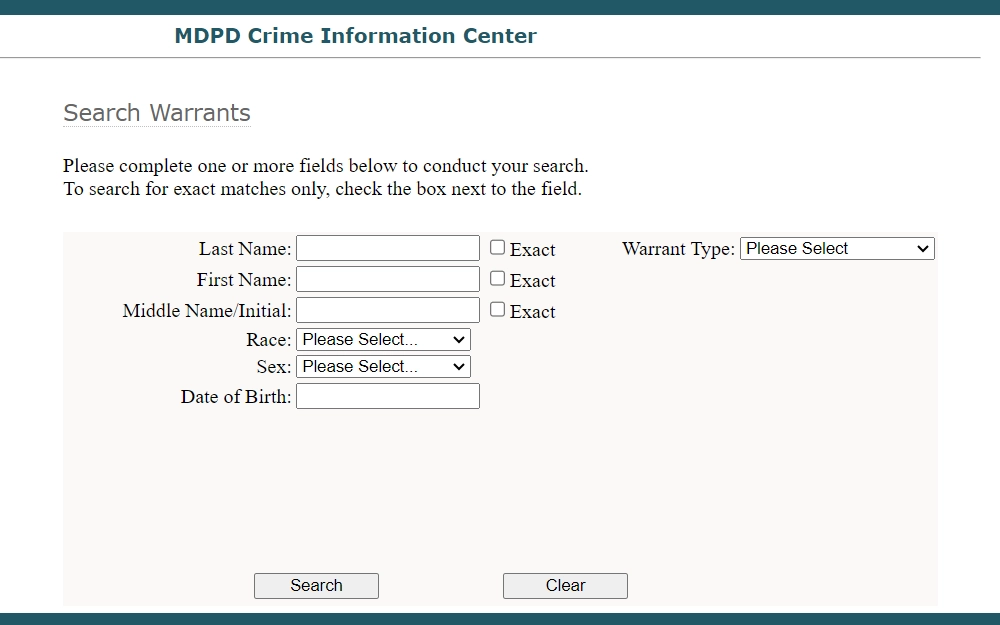
Searchers can also request information via the Miami-Dade Police Department Public Records System. Record requests through the police department may accrue fees of 15 cents per single-sided page, as laid out in the fee schedule provided by the Miami-Dade Police Department, their contact information can be found below:5
Miami-Dade Police Department
Central Records Bureau Public Counter
9105 NW 25th Street
Doral, FL 33172
Phone: 305-471-2085
Fax: 305-471-2072
Email: [email protected]
Another useful resource is the Clerk of the Court & Comptroller of Miami Dade County.6 Records requests can be made in writing to:
Clerk of the Court & Comptroller
73 W. Flagler Street
Miami, Florida 33130
Phone: 305-275-1155
Broward County: Interested parties are empowered to access all Broward County warrant details. This information is accessible through the Broward County Clerk of the Courts website using the free Case Search – Public tool. It requires at least a last and first name for queries (partial matches need at least three characters to generate).
However, options to search by the following are available:
- Court Type
- Last Name
- First Name
- Middle Name
- Date From
- Date To
If the user has the full name of the person they’re researching, they can insert that with the court type “all” selected. However, it can help to narrow down results by selecting the appropriate court. The results screen shows a case number, case style, case type, filing date, case status and access level.
Clicking on the case number reveals significantly more information, including:
- A List of Alias Names
- Physical Profile
- Address
- Attorneys on File
- Charges (including offense date, charge, degree and detail)
- Warrants (including issue date, charges, details and status)
- Bonds
- Arrests
- Dispositions
- Collections
- Events & Documents (which may include violation of probation or parole information)
The warrants section shows the issue and serves dates, providing information on whether the individual in question has ever had one, even if it’s already been satisfied.
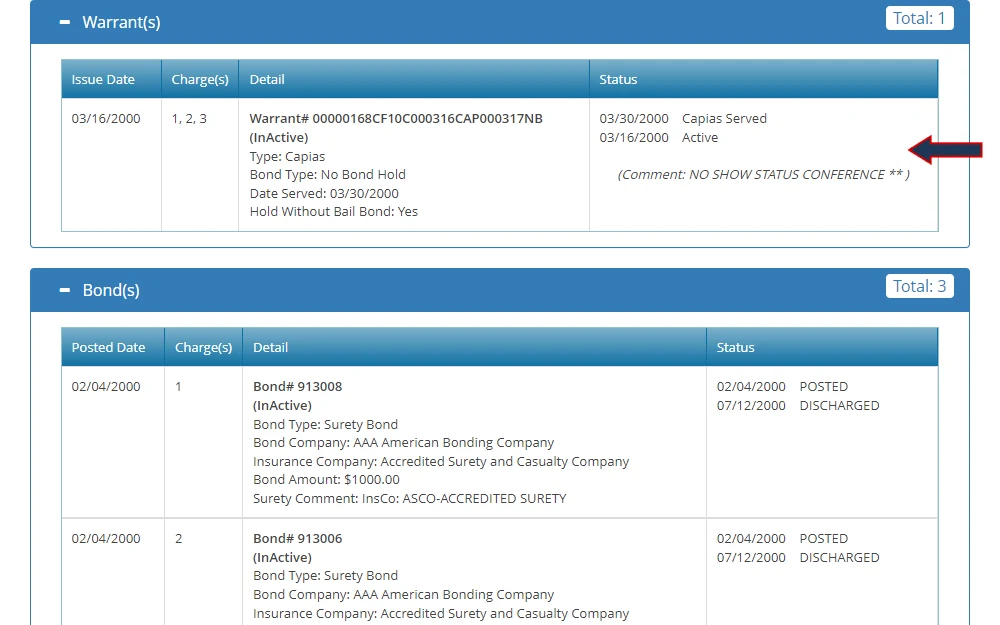
For in-person assistance, contact:
Broward County Clerk of the Courts
201 SE 6th Street
Fort Lauderdale, FL 33301
Phone: 954-831-6565
Palm Beach County: Palm Beach County requires warrant searches to go through the county clerk’s court records request process, which can be accessed online.8 Anyone can register to search the database, and there’s no fee to use the search tool. Users fill in the last and first name fields, then hit search. The system will return a list of relevant court cases.
Click on the case number of an individual and ensure it’s the correct person. Case numbers highlighted in yellow indicate the person has an active warrant. Clicking on the case number brings up case information. Select the “Warrants and SVC docs” option, and click on the document ID number to review the information.
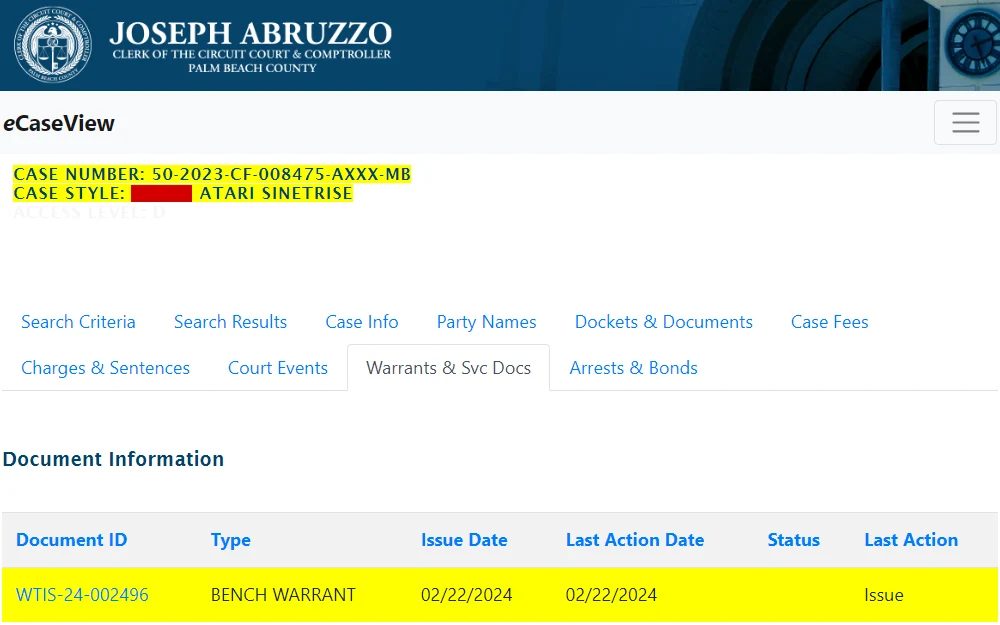
The Palm Beach County Clerk of Court can be contacted at the address below, or individuals can refer to the Palm Beach County warrant lookup tutorial for streamlined guidance on the most effective ways to access these records.
Palm Beach County Clerk of Court
Main Courthouse
205 N. Dixie Hwy.
West Palm Beach, FL 33401
Phone: 561-355-2996
Email: [email protected]
Reach Out to Municipal Agencies & Courts in Florida for Warrant Information
In some cases, it’s necessary to search for warrants at the city level. Many cities don’t have online warrant search tools, but recommend the use of the statewide search tool. Below, find a list of some of the most populous cities in Florida and how to request information about warrants.
Jacksonville: In Jacksonville, researchers can request warrant information online with a general public records request. This requires individuals to make an online account before filling in the web form. Record requests can also be obtained in person, by mail or over the phone at:
Jacksonville Sheriff’s Office
Attn: Public Records Unit
501 East Bay Street
Jacksonville, FL 32202
Phone: 904-630-2209
Tampa uses the Hillsborough County Sheriff’s Office for warrant inquiries.10 The search tool is streamlined, with fields for warrant number, name, race, sex and date of birth. It accepts partial tools. After the user completes the CAPTCHA, the system provides the same information. Clicking on the warrant number generates more information, including:
- Last Known Address
- Aliases
- Investigating Officer and Agency
- Presiding Court and Case Number
- Charges
Orlando: Orlando warrant searches require contact with the Orange County Sheriff’s Office Fugitive Unit.11 The sheriff’s office recommends using the statewide Warrants Search tool for online lookups. Otherwise, researchers can request records online or from the office directly. Record requests may generate fees based on what is ordered. For example, a local criminal history check costs $5. Request county information from:
Orange County Sheriff’s Office
Records/Identification Section
2500 West Colonial Drive
Orlando, FL 32804
Phone: 407-254-7280
Tampa: To find warrant information about warrants in Tampa, use the Hillsborough County Sheriff’s Office Warrant Inquiry form.10 This is free to search and requires only a name. The search can be refined with information about the offender’s race, gender, or date of birth.
The results form will show a list of names and warrant numbers that fully or partly match the name provided. Clicking on the warrant number will open a more detailed results page with information about the offender.
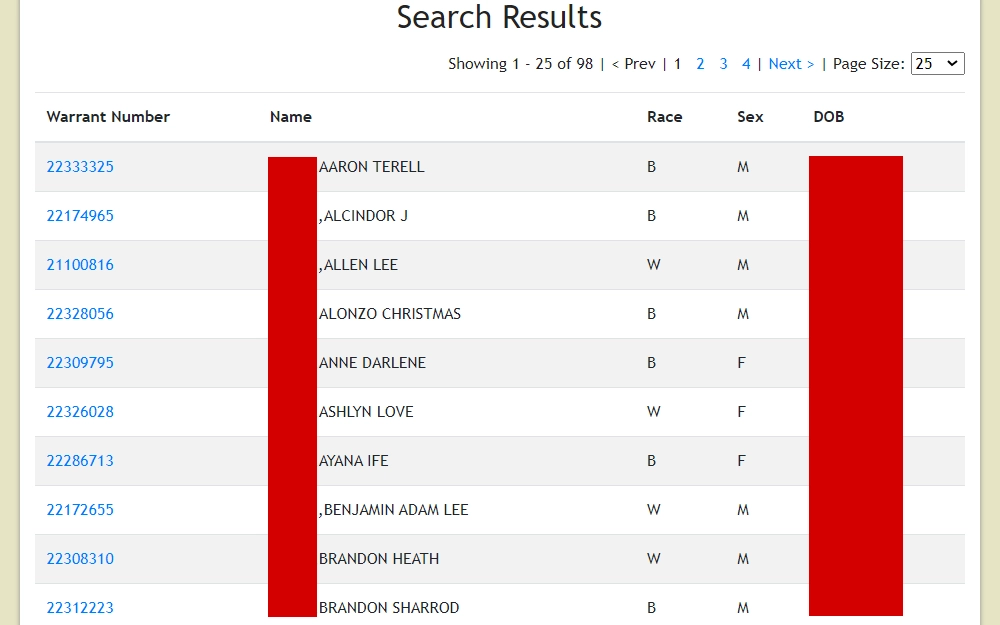
Check out the Hillsborough County warrant search instructions or contact the Sheriff’s Office for further insights.
Hillsborough County Sheriff’s Office
P.O. Box 3371,
Tampa, FL 33601
Telephone: 813-247-8200
Search for Federal Warrants in Florida & Throughout the U.S.
It’s not as common to search for federal warrants, though it is possible. To begin a warrant search, check some common wanted and fugitive lists maintained by federal agencies, including:
These lists only cover the most wanted individuals. However, using PACER (Public Access to Court Electronic Records) also reveals federal criminal court records.
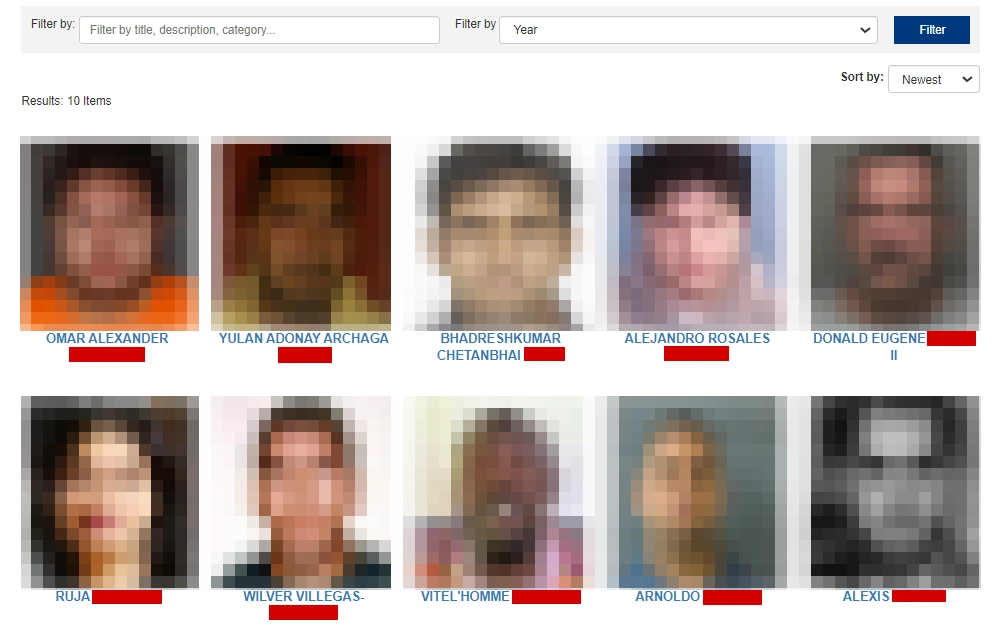
Discover federal arrests and search warrants with PACER’s Case Locator tool. It requires users to create an account first. Search the individual in question’s name, then select “Case Number,” followed by either “Docket Sheet” or “History/Documents.” Be aware that each page accrues a fee.13
Beyond that, an attorney may offer assistance with a FOIA request through the U.S. Marshals Service, though this will also accrue fees.
What Types of Warrants Are Issued in Florida & What Do They Mean?
Warrants are written legal orders, typically issued by a judge or magistrate. They are necessary to allow law enforcement to legally infringe on an individual’s rights. Typically, warrants do not expire once issued, so even those issued decades ago may result in an arrest if the named person comes into contact with law enforcement.
Details of various types of warrants (though this is not a comprehensive list) that are common in Florida can be found below.
- Arrest Warrants: Judges issue arrest warrants in response to a crime after receiving reasonable evidence the named person has committed a crime.
- Bench Warrants: Individuals in contempt of court for not appearing when legally summoned may have a bench warrant issued. This allows law enforcement to detain the named person and bring them to court, or to jail until their hearing date.
- Probation & Parole Violation Warrants: Those who violate the terms of their community supervision (probation and parole) receive warrants for their arrest to determine whether they will be allowed to remain out of jail.
- Traffic Warrants: Traffic warrants may be issued when an individual is suspected of committing a traffic violation, such as driving while under the influence, reckless driving, leaving the scene of an accident or knowingly driving without a license.
- Child Support Warrants: Noncustodial parents who refuse to pay court-ordered child support may have a warrant issued for their arrest. Judges try to avoid issuing these warrants, but they reserve the right to do so.
- Capias Warrants: Capias warrants may be issued for several reasons in Florida. They’re often issued after formal criminal charges against an individual (as opposed to arrest warrants, which primarily serve to bring an individual into court prior to charges being filed). They may be issued for failure to appear in court, extradition or committing another crime.
- Fugitive Warrants: Fugitive warrants allow the arrest of individuals to return them to the jurisdiction that oversees their charges. If someone is wanted for committing a crime out of state, but flees to Florida, for example, they may be arrested under a fugitive warrant to be returned home.
- Search Warrants: These allow an individual’s private property to be searched by law enforcement for evidence of a crime.14 Law enforcement can confiscate any evidence discovered.
Dealing With Warrants & Notifying or Reporting Persons of Interest (FL)
Discovering a warrant has been issued can be overwhelming and stressful. While someone may be tempted to ignore the warrant in hopes it goes away, this is a risky move, as any contact with law enforcement for any reason requiring identification may result in the wanted person’s arrest.
To prevent being unexpectedly arrested, a wanted individual should resolve the warrant as soon as possible.
If an acquaintance has a warrant out, the right course of action depends on whether the individual is trustworthy. If a friend, family member or other trusted individual has a warrant, letting them know allows them to resolve it quickly without major disruptions to their life.
If the wanted person is dangerous, the person who becomes aware of the situation should notify the relevant local or state law enforcement agency directly or via the Florida Tip-Line.15, 16 Remember, the statewide Warrant Search tool allows users to send tips online and provides the phone number for the agency holding the warrant.
There are three primary courses of action to resolve a warrant. The first and simplest option is to pay any fines or schedule a court date if the warrant is for nonpayment or skipping court without a valid reason. The second is to obtain legal counsel and allow them to handle it.
A lawyer well-versed in the legal system and how to manage warrants can take care of the resolution process quickly, scheduling court dates or taking the necessary steps to have the warrant removed.
The final option requires more planning. People with a warrant out can turn themselves in to resolve it. However, before doing so, a wanted person should contact friends or family members to make personal arrangements (such as caring for pets or requesting time off work).
It’s a good idea for anyone in this situation to line up a lawyer beforehand and set a preemptive appointment with a bail bondsman to facilitate a prompt release. If a warrant search reveals an order for arrest, following these guidelines can streamline the process of surrendering and help minimize disruptions.
With the access to public information and the right tools, anyone can perform a Florida warrant search for free and obtain the necessary data; dig deeper into anyone’s past by looking up FL arrest and criminal records as well as accessing all free public information on Florida residents (probation, parole, court cases, marriages, property, and more).
References
1Florida Legislature. (2012). The 2012 Florida Statutes – Title XIX – Public Business, Chapter 286 – Public Business: Miscellaneous Provisions. Online Sunshine. Retrieved March 19, 2024, from <http://www.leg.state.fl.us/statutes/index.cfm?App_mode=Display_Statute&URL=0200-0299/0286/0286ContentsIndex.html&StatuteYear=2012&Title=-%3E2012-%3EChapter%20286>
2Florida Department of Law Enforcement. (2024). Wanted Persons Search. Public Access System (PAS). Retrieved March 19, 2024, from <http://pas.fdle.state.fl.us/pas/restricted/PAS/person/WantedPersons.jsf>
3Florida Department of Law Enforcement. (n.d.). Office of the General Counsel – Public Records. Retrieved March 19, 2024, from <https://www.fdle.state.fl.us/OGC/Public-Records.aspx>
4Miami-Dade Police Department. (2024). MDPD Crime Information Center. Retrieved March 19, 2024, from <http://warrants.mdpd.com/SearchWarrants.aspx>
5Miami-Dade Police Department. (n.d.). Request Police Reports & Records. Retrieved March 19, 2024, from <https://www.miamidade.gov/global/service.page?Mduid_service=ser1470774597039291>
6Miami-Dade County Clerk of the Court and Comptroller. (n.d.). Criminal Court. Retrieved March 19, 2024, from <https://www.miamidadeclerk.gov/clerk/criminal-court.page>
7Broward County Clerk of the Courts. (2024). Case Detail – Public. Retrieved March 19, 2024, from <https://www.browardclerk.org/Web2/CaseSearchECA/CaseDetail/?caseid=MjcyMzE4NA%3d%3d-XFRq84DL0tY%3d&caseNum=00000168CF10C&category=CR&accessLevelCodeOUT=ANONYMOUS&ato=D>
8Palm Beach County Clerk of the Circuit Court & Comptroller. (n.d.). Court Records. Retrieved March 19, 2024, from <https://www.mypalmbeachclerk.com/records/court-records>
9Palm Beach County Clerk of the Circuit Court & Comptroller. (2024). eCaseView. Retrieved March 19, 2024, from <https://appsgp.mypalmbeachclerk.com/eCaseView/search.aspx>
10Hillsborough County Sheriff’s Office. (2024). Warrant Search. Retrieved March 19, 2024, from <https://webapps.hcso.tampa.fl.us/WarrantInquiry/>
11Orange County Sheriff’s Office. (n.d.). Records/Identification Section. Retrieved March 19, 2024, from <https://www.ocso.com/en-us/Services/Administrative-Services/Support-Services-Division/Records-Identification-Section>
12Federal Bureau of Investigation. (2022). Ten Most Wanted Fugitives. Retrieved March 19, 2024, from <https://www.fbi.gov/wanted/topten/>
13Administrative Office of the U.S. Courts. (n.d.). PACER Pricing: How fees work. Public Access to Court Electronic Records (PACER). Retrieved March 19, 2024, from <https://pacer.uscourts.gov/pacer-pricing-how-fees-work>
14Florida Legislature. (2012). The 2012 Florida Statutes. Online Sunshine. Retrieved March 19, 2024, from <http://www.leg.state.fl.us/statutes/index.cfm>
15Florida Attorney General’s Office. (n.d.). State Law Enforcement Agencies. Retrieved March 19, 2024, from <https://www.myfloridalegal.com/citizen-safety-center/state-law-enforcement-agencies>
16Florida Attorney General’s Office. (n.d.). Tips. Retrieved March 19, 2024, from <https://www.myfloridalegal.com/home-page/tips>
